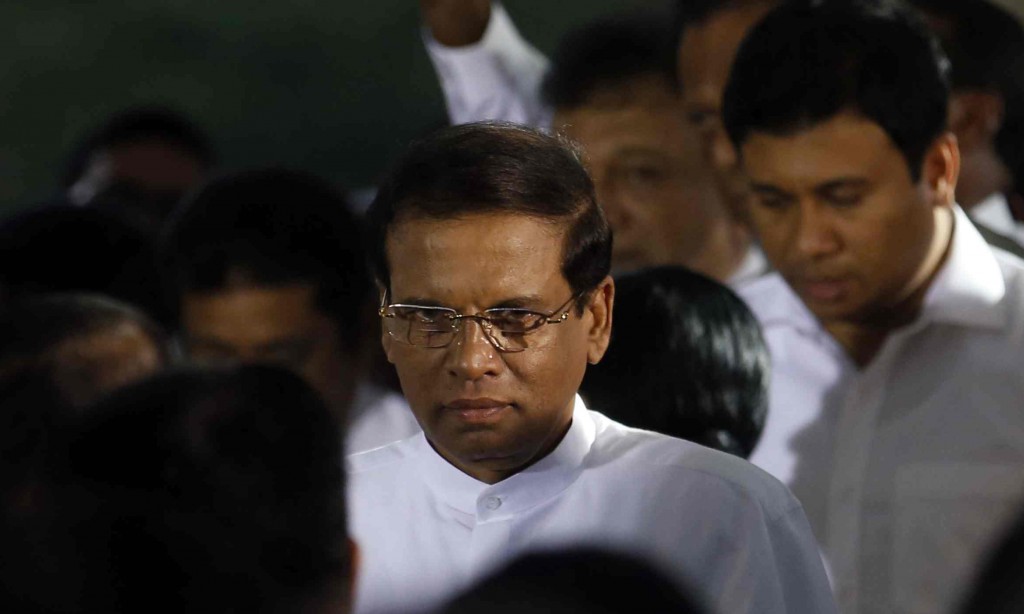Photo courtesy Die Presse
The results are all in and Mahinda Rajapaksa has been defeated at the polls. This is a great victory for almost all concerned. It is a victory for the coalition, which dared to challenge the regime with key players, who either voluntarily or through persuasion gave up their prominence. It is a victory for the humble voter, who has demonstrated time and again since independence that they will not tolerate power being held on to for long. It is a victory even for Mahinda Rajapaksa, who demonstrated his statesmanship by leaving Temple Trees when less than a third of the results were out – on balance, history will probably judge him kindly; if he had served another term, his name would have been mud.
Although Mahinda Rajapaksa will rightly get the credit for bringing the country into a post-war phase, he lost the election because he did not know how to lead us to a post-conflict one. In fact, conflict probably increased during his regime. The Tamil and Muslim votes were decisive; also the votes of those who rejected militarization and the centralization of power. As coalition leaders plan to take over the reins, it is best that they and we learn lessons from the election itself.
Four (or even two) months ago, the defeat of the powerful Rajapakse regime, backed by his powerful brothers, seemed impossible. But in September 2014 the Uva Provincial Council election was won by the UNP, spearheaded by Harin Fernando who gave up his Parliamentary seat to risk the hustings. And then in November 2014 Maithripala Sirisena defected from the regime and, with hardly any prior experience or pedigree, became the leader of a motley band of parties. Although Sri Lanka is a very religious country, with its leaders prominently paying lip service to religious values, hardly ever have we seen so starkly demonstrated in public life that it is better to be right and weak rather than wrong and strong – that is why this election result is so historic. Hopefully the coalition leaders will remember this themselves while jockeying for power in the coming days.
However strong a regime is, it must be resisted if it abuses power; and since there are moral laws that operate outside of our physicalist framework, that resistance will win in the end. Although this resistance snowballed in the last two to four months, coalition partners would do well to remember that it is probably only the Tamil National Alliance that has almost singlehandedly resisted this regime for the past four to five years. When democratic institutions in the country were being eroded in the form of the 18th Amendment and the impeachment of Chief Justice Shirani Bandaranayake, it was the TNA that was a lone and articulate voice in Parliament against it. Despite standing in the breach on national issues of this nature, the TNA has consistently been branded as an LTTE front, perhaps even by some of its fellow coalition members. In fact every opponent of the past regime (including Shirani Bandaranayake) was labeled an LTTE stooge – we need to get beyond this political tomfoolery, assume some mature statesmanship and solve our continuing national problem.
I have lived through two southern insurrections and a northern one, and been (only slightly) affected by all three. However, I have never seen these insurrections as acts of lawlessness but rather ones of desperation. Although I have welcomed the peace that prevailed after each of them, I have always been nagged by guilt as to whether we have properly addressed the injustices that gave rise to those insurrections. It is almost impossible to have an armed uprising with only perceived injustices – those injustices must have been, and may still be very real. As a society we have dealt very badly with such uprisings. In general they have been crushed, probably with undue force. We now have an international inquiry into war crimes in the northern insurrection; and questions about the southern one surface from time to time. At least we had a Youth Commission Report after the latter, which paved the way for the JVP to become a political party rather than a military outfit; and for Colombo society to feel a sense of guilt and responsibility for what happened – “Kolambata kiri, apata kekiri” was the catch phrase in that report. I cannot see any sense of guilt or responsibility in Colombo society about the northern insurrection. So the coalition leaders will have to take that on board as an imperative. They (and we) would do well to listen again to Anura Kumara Dissanayake, himself a “child” of the southern insurrection, who now pleads on behalf of the northerners.
